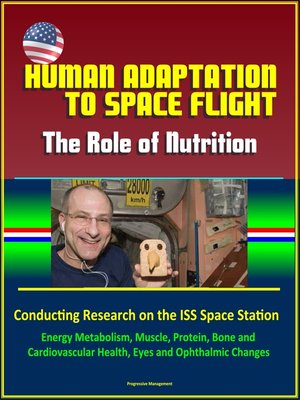Human Adaptation to Space Flight
ebook ∣ The Role of Nutrition--Conducting Research on the ISS Space Station, Energy Metabolism, Muscle, Protein, Bone and Cardiovascular Health, Eyes and Ophthalmic Changes
By Progressive Management

Sign up to save your library
With an OverDrive account, you can save your favorite libraries for at-a-glance information about availability. Find out more about OverDrive accounts.
Find this title in Libby, the library reading app by OverDrive.



Search for a digital library with this title
Title found at these libraries:
| Loading... |
This excellent report has been professionally converted for accurate flowing-text e-book format reproduction. This NASA reference provides a review the history of and current state of knowledge about the role of nutrition in human space flight. We have attempted to organize this from a more physiological point of view, and to highlight systems, and the nutrients that support them, rather than the other way around.
New risks to human health have been identified, including one related to vision changes in astronauts on ISS. We detail herein data suggesting a tie-in of the folate- and vitamin B12-dependent 1-carbon metabolism pathway with these changes. Recent publications have documented the effects of good nutrition and heavy resistance exercise on bone metabolism during space flight. After more than a half century of human space flight, this is the first evidence of the ability to mitigate the loss of bone mineral density in astronauts on long-duration missions. Although more work remains to be done, any progress is incredibly exciting.
Chapter 1 - Introduction * Conducting Nutrition Research on ISS * Blood Collection * Urine Collection * Biological Sample Stowage and Return * Food Intake Monitoring * Body Mass * Chapter 2 - Energy and Fuel Metabolism * Energy Expenditure and Requirements * Energy Intake * Implications for Inadequate Energy Intake * Carbohydrate * Fat (and Fatty Acids) * Cofactors in Energy Metabolism * Chapter 3 - Muscle and Protein * Protein Intake * Vitamin B6 * Muscle Loss and Protein Turnover in Microgravity * Ground Analog Studies * Muscle Loss Countermeasures * Mechanical * Pharmacological * Nutritional * Protein and Bone * Chapter 4 - Bone * Bone Loss * Bone Metabolism * Bone Loss Countermeasures * Exercise * Gravity * Vibration * Pharmacological Agents * Nutritional Countermeasures * Nutrients and Bone Health * Calcium * Vitamin D * Vitamin K * Phosphorus * Magnesium * Zinc (and Lead) * Unique Aspects of Calcium and Space Flight * Urine Processing and Water Reclamation * Natural Calcium Isotope Composition of Bone * Chapter 5 - Iron and Hematology * Iron * Copper * Chapter 6 - Cardiovascular Health * Energy * Magnesium * Ongoing and Future Research * Oxidative Stress * Omega-3 Fatty Acids * Healthier Diets * Chapter 7 - Sodium, Potassium, Fluid, and Renal Stone Risk * Sodium and Chloride * Potassium * Fluid * Renal Stone Risk * Chapter 8 - Space Flight Ophthalmic Changes and Nutrition * Ophthalmic Changes * One-Carbon Metabolism * Folate * Vitamin B12 * Biotin * Vitamin A * Chapter 9 - Immune Function, Inflammation, and Nutrition * Energy Intake * Protein and Amino Acids * Vitamin D * Vitamin B12 * Sodium * Vitamin A * Vitamin C * Vitamin E * Copper * Zinc * Polyphenols * Iron * Polyunsaturated Fatty Acids * Chapter 10 - Antioxidants and Oxidative Stress * Hypoxic Conditions * Extravehicular Activity * Reactive Oxygen Species and Exercise * Radiation Exposure * Oxidative Damage Markers During Space Flight and in Ground Analogs * Antioxidants and Related Nutrients: Selenium, Vitamin E, Vitamin C * Chapter 11 - Pharmacology and Drug-Nutrient Interactions * Supplements versus Whole Foods * Dietary Factors * Metabolism of Nutrients * Monoamine Oxidase Inhibitors * Antacids and Proton Pump Inhibitors * Summary of Pharmacology and Drug-Nutrient Interactions






